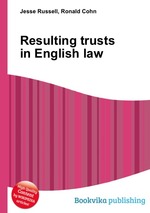Resulting trusts in English law
Jesse Russell Ronald Cohn
бумажная книга
High Quality Content by WIKIPEDIA articles! Resulting trusts in English law are trusts created where property is not properly disposed of. It comes from the Latin resultare, meaning to spring back, and was defined by Megarry VC as "essentially a property concept; any property that a man does not effectually dispose of remains his own". These trusts come in two forms: automatic resulting trusts, and presumed resulting trusts. Automatic resulting trusts arise from a "gap" in the equitable title of property. The equitable maxim "equity abhors a vacuum" is followed: it is against principle for a piece of property to have no owner. As such, the courts assign the property to somebody in a resulting trust to avoid this becoming an issue. They occur in one of four situations: where there is no declaration of trust, where an express trust fails, where there is surplus property, or upon the dissolution of an unincorporated association. Rules differ depending on the situation and the type of original trust under dispute; failed charitable trusts, for example, have the property reapplied in a different way from other forms of trust.


